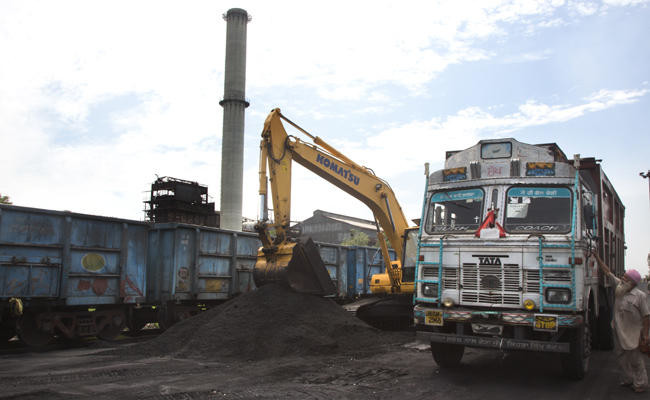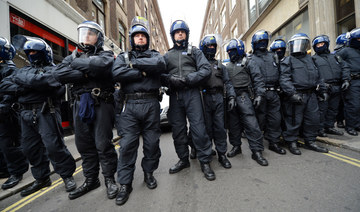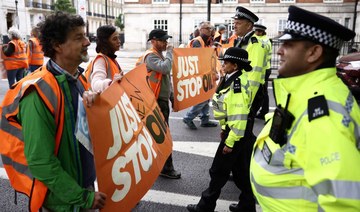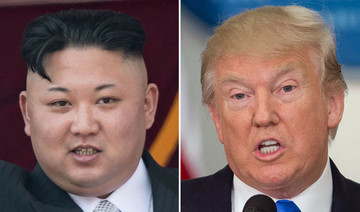NEW DELHI: US oil refineries that are unable to sell a dirty fuel waste product at home are exporting vast quantities of it to India instead.
Petroleum coke, the bottom-of-the-barrel leftover from refining Canadian tar sands crude and other heavy oils, is cheaper and burns hotter than coal. But it also contains more planet-warming carbon and far more heart- and lung-damaging sulfur — a key reason few American companies use it.
Refineries instead are sending it around the world, especially to energy-hungry India, which last year got almost a fourth of all the fuel-grade “petcoke” the US shipped out, an Associated Press investigation found. In 2016, the US sent more than 8 million metric tons of petcoke to India. That’s about 20 times more than in 2010, and enough to fill the Empire State Building eight times.
The petcoke being burned in countless factories and plants is contributing to dangerously filthy air in India, which already has many of the world’s most polluted cities.
Delhi resident Satye Bir does not know all the reasons Delhi’s air is so dirty, but he says he feels both fury and resignation.
“My life is finished ... My lungs are finished,” said the 63-year-old Bir, wheezing as he pulls an asthma inhaler out of his pocket. “This is how I survive. Otherwise, I can’t breathe.”
Laboratory tests on imported petcoke used near New Delhi found it contained 17 times more sulfur than the limit set for coal, and a staggering 1,380 times more than for diesel, according to India’s court-appointed Environmental Pollution Control Authority. India’s own petcoke, produced domestically, adds to the pollution.
Industry officials say petcoke has been an important and valuable fuel for decades, and its use recycles a waste product. Health and environmental advocates, though, say the US is simply exporting an environmental problem. The US is the world’s largest producer and exporter of petcoke, federal and international data show.
“We should not become the dust bin of the rest of the world,” said Sunita Narain, a member of the pollution authority who also heads the Delhi-based Center for Science and the Environment. “We certainly can’t afford it; we’re choking to death already.”
Embracing tar sands
For more than a century, oil refining has served as a lifeline in America’s industrial heartland, where thousands of manufacturing jobs have been lost in recent decades.
In gritty northwest Indiana, a sprawling oil refinery and steel mills dominate the Lake Michigan shoreline. Freight trains chug through working-class neighborhoods. And smokestacks and distillation towers still symbolize opportunity.
Local officials and workers cheered when the BP Whiting refinery invested $4.2 billion so it could process crude extracted from tar sands in the boreal forest of Alberta, Canada.
US refineries embraced tar sands oil and other heavy crudes, when domestic oil production was stagnant before the hydraulic fracturing boom. Some of the biggest built expensive units called cokers to process the gunky crude into gasoline, diesel, ship fuel and asphalt, which leaves huge amounts of petroleum coke as waste. When BP Whiting’s coker in Whiting, Indiana was finished in 2013, its petcoke output tripled, to 2.2 million tons a year.
Petcoke traditionally was used in the US to make aluminum and steel after its impurities were removed. But when those mills closed or moved to other countries, the need for petcoke waned, although some power plants still use it. Other industries that had burned petcoke did not want to invest in costly upgrades to control higher emissions of sulfur and other pollutants or switched to cleaner and cheaper natural gas.
The American Fuel and Petrochemical Manufacturers, a petroleum industry trade group, released a statement to the AP saying that cokers “allow the United States to export petroleum coke to more than 30 countries to meet growing market demand.”
“Petroleum coke is used globally as a cost-effective fuel, as well as an integral component in manufacturing,” AFPM said.
But experts say it’s not market forces that are driving US refiners to make this waste product from heavy oil refining. The refineries just need to get rid of it, and are willing to discount it steeply — or even take a loss — which helps drive the demand in developing countries, experts said.
“It’s a commodity that defies explanation (because) there’s not a financial market,” said Stuart Ehrenreich, an oil industry analyst who once managed petcoke export terminals for Koch Industries. “But at the end of the day, the coke has got to move.”
So it’s usually priced cheaper than even coal, sold around the world through a network of businesses — from boat captains and stevedores to buyers, brokers and middlemen — and sent on an epic, weeks-long journey by rail, barge and ship.
There are fewer than a dozen big traders globally. Among the largest are Oxbow Energy Solutions and Koch Carbon, both led by members of the politically conservative and climate-skeptical Koch family. Neither they nor a dozen US oil companies and traders contacted by the AP would talk about petcoke. They cited past controversies over the mountains of the waste stored at Midwest refineries, or said they wanted to avoid angering business partners.
In India, no factory managers would allow AP access, and federal officials did not respond to repeated requests for interviews.
With the petcoke market volatile and competitive, industry holds information close, hoping to maintain an edge and make a profit.
“It’s like the Wild West,” said Ehrenreich.
Dirty air
Petcoke, critics say, is making a bad situation worse across India. About 1.1 million Indians die prematurely as a result of outdoor air pollution every year, according to the Health Effects Institute, a nonprofit funded by the US Environmental Protection Agency and industry.
In the capital of New Delhi, pollution has sharply increased over the past decade with more cars, a construction boom, seasonal crop burning and small factories on the outskirts that burn dirty fossil fuels with little oversight. In October and November, for the second year in a row, city air pollution levels were so high they couldn’t be measured by the city’s monitoring equipment. People wore masks to venture out into gray air, and newspaper headlines warned of an “Airpocalypse.”
“Fifty percent of children in Delhi have abnormalities in their lung function — asthma, bronchitis, a recurring spasmodic cough. That’s 2.2 million children, just in Delhi,” said Dr. Sai Kiran Chaudhuri, head of the pulmonary department at the Delhi Heart & Lung Institute.
The country has seen a dramatic increase in sulfur dioxide and nitrogen dioxide emissions in recent years, concentrated in areas where power plants and steel factories are clustered. Those pollutants are converted into microscopic particles that lodge deep in the lungs and enter the bloodstream, causing breathing and heart problems.
It’s impossible to gauge precisely how much is from petcoke versus coal, fuel oil, vehicles and other sources. But experts say it certainly is contributing.
Indian purchases of US fuel-grade petcoke skyrocketed two years ago after China threatened to ban the import of high-sulfur fuels. Although Indian factories and plants buy some petcoke from Saudi Arabia and other countries, 65 percent of imports in 2016 were from the US, according to trade data provider Export Genius.
“It is definitely alarming,” Chaudhari said. “The government should know what they’re getting, what they’re using and what are its harmful effects.”
In the north Indian industrial district of Moradabad, several hours’ drive from the capital, villagers see the skies getting dingier but have little information about what happens behind factory gates.
Only four factories are on record as using petcoke. But dozens buy it from middlemen running open-air fuel depots, according to Sarvesh Bansal, a natural gas distributor in the north Indian city who leads the ad-hoc local environmental group called WatAir.
“We want the factories moved very far away from here,” said a 25-year-old rice farmer named Mohammad Sarfaraz, who lives in nearby Farid Nagar. He and others aren’t sure what pollutants are being spewed, but they nevertheless protested at nearby factories a few years ago until shooed away by guards. “Many illnesses occur because of the factories. Small kids and old people fall sick very easily. There is breathlessness, heart disease, pain in the hands and legs.”
India’s cement companies were first to bring in petcoke, and still import the most, though cement experts say sulfur is absorbed during manufacturing.
As word spread of the cheap, high-heat fuel, other industries began using it in their furnaces — producing everything from paper and textiles to brakes, batteries and glass, according to import records compiled by Export Genius. The government was caught off guard by the shift, and there are scant records of how much petcoke is being burned.
Petcoke’s use was further encouraged by low import tariffs and a lack of regulations on its most potent pollutants.
Industries also like that petcoke, which is around 90 percent carbon, burns hot. So they can use less of it to produce the same heat as coal — though coal still overshadows petcoke in factory furnaces.
Within a decade, India’s petcoke appetite grew so voracious that it began producing and selling its own, and Indian refineries today are making about as much as the country is importing. One of the biggest refiners — Mumbai-based Reliance Industries Lts., owned by India’s wealthiest businessman, Mukesh Ambani — has ramped up petcoke production.
Still, US petcoke remains popular.
Indians typically buy petcoke with about 6-7 percent sulfur — more than double than with most coal — because it’s the least expensive, said Vedanth Vasanth, director of Viva Carbon Pvt. Ltd., a supplier based in the southern city of Chennai that helps broker petcoke contracts between Indian buyers and sellers abroad.
J.P. Gupta, whose factory in Moradabad district makes acrylic fibers used in clothing, said his factory burns through some 4,000 metric tons of Indian-made petcoke every month.
The factory spent about $300,000 on equipment to control sulfur, he said, but would have spent 50 percent more on pollution control if it had opted for US petcoke, which he says is dirtier.
“We rejected the imports...,” he said. “But there are some who are not bothering about the pollution.”
At an open-air brick kiln just 10 kilometers (six miles) down the road, workers shoveled a mix of petcoke and coal into a fiery furnace. Other than thick wooden sandals to protect their feet from the heat, they wore no safety gear or breathing masks. And there was no equipment to control the gases or soot billowing from the chimney.
Such small factories operating off the electricity grid in India’s vast informal sector account for 25 to 30 percent of the country’s total energy generation. Often crammed into city outskirts, these outfits manufacturing everything from plastic bangles to metal screws rely on fossil fuels to keep their furnaces afire — the cheaper, the better.
Few adhere to pollution standards, said Ajay Mathur, head of The Energy Research Institute, a nonprofit policy research organization in New Delhi. “This is an area where we need to have regulations sooner rather than later,” he said
An uncertain future
Although petcoke has been an industrial resource since the 1930s, the high sulfur content and sheer petcoke volume — and growing concern about climate change, as well as particle pollution — could restrict or halt its production, experts said.
Governments could decide to tax high-carbon fuels such as petcoke. They could ban high-sulfur or high-carbon fuels. Or they could set pollution limits that make petcoke use impractical.
In India, judges of the National Green Tribunal demanded in May that the government investigate the environmental and health impacts of petcoke.
“The government was not doing anything,” said the WatAir leader Bansal, whose environmental group launched the lawsuit. “There is no law in India, no control. So the whole world’s petcoke is coming to India, and it’s getting consumed here.”
The government’s environment ministry has dismissed the idea that petcoke threatens public health in the nation’s capital. But the country’s Supreme Court, which has consistently demanded or enacted tougher pollution control measures, recently banned petcoke use by some industries as of Nov. 1 in the three states surrounding pollution-choked New Delhi. It also demanded tighter pollution standards that — if enforced — could further limit its use nationwide.
“This is a completely disgusting state of affairs,” the judges said in their (Oct. 24) ruling, “and this is hardly the way in which the Ministry ought to function if it is expected to perform its duties sincerely, honestly and with dedication.”
The court last month also urged all states across India to pass similar bans.
The ministry refused months of requests for interviews, both before and after the court’s ruling. But analysts say that, short of a nationwide ban, petcoke use could be mostly unaffected.
“The petcoke markets grew so fast across the country that a ban around New Delhi isn’t going to put a huge dent in the overall demand for petcoke,” said Jeffrey McDonald, an analyst at S&P Global Platts.
Refineries could choose to stop producing petcoke, by using more expensive refining methods that would essentially convert all the heavy oil to other products.
But it’s more likely that if new pollution limits do affect its use, US refiners will just find new petcoke customers in other developing nations, especially in Asia and Africa, experts and environmentalists said.
“It’s a classic case of environmental dumping,” said Lorne Stockman, director of the environmental group Oil Change International. “They need to get rid of it, so it’s dumped into a poor, developing country.”
Pollution-choked India buying dirty US oil byproduct
Pollution-choked India buying dirty US oil byproduct

1 dead, others injured after London-Singapore flight hit severe turbulence, Singapore Airlines says

- The airline said the aircraft was a Boeing 777-300ER with a total of 211 passengers and 18 crew on board
BANGKOK: Singapore Airlines says a person has died aboard and others were injured when a London-Singapore flight encountered severe turbulence.
Singapore’s Flight SQ321 from Heathrow was diverted to Bangkok and landed at 3:45 p.m. local time at Suvarnabhumi Airport, the airline announced in its Facebook page. The airline said the aircraft was a Boeing 777-300ER with a total of 211 passengers and 18 crew on board.
Local emergency crews from Samitivej Srinakarin Hospital were on site to transfer injured people off the runway for treatment. Videos posted on the LINE messaging platform by Suvarnabhumi Airport showed a line of ambulances streaming to the scene.
Britain’s new protest laws unlawful, London court rules in rights group’s challenge

- Civil rights group Liberty took the government to court over changes to public order laws made last year
- Judge rules new regulations gave the police almost unlimited powers to shut down protests
LONDON: Britain unlawfully gave police wider powers to impose conditions on peaceful protests which cause “more than minor” disruption to the public, London’s High Court ruled on Tuesday.
Civil rights group Liberty took the government to court over changes to public order laws made last year, which it says gave the police almost unlimited powers to shut down protests.
The case was heard in February amid a wider crackdown on protest movements in Britain and across Europe, as environmental activists have used direct action protests to demand urgent government action against climate change.
Judges David Bean and Timothy Kerr ruled in the group’s favor on Tuesday, finding that the regulations granting the new powers were unlawful.
The High Court granted the government permission to appeal and suspended its decision that the new powers should be quashed pending the outcome of the appeal.
Liberty’s legal action focused on the Public Order Act, under which the police can impose conditions on a protest if it could cause “serious disruption to the life of the community.”
The law was amended last year, so police could impose conditions in cases where a protest could cause “more than minor” disruption, which Liberty said was unlawful.
Government lawyers argued that ministers were given express powers to amend the law on what amounted to serious disruption.
But the High Court ruled that the government exceeded its powers, which “did not extend to lowering the threshold for police intervention.”
Thai minister quits over legal complaint seeking PM’s dismissal

- Pichit Chuenban says his resignation would allow the country ‘to move ahead and not impact the administrative work of the prime minister that needs continuity’
BANGKOK: A Thai minister at the center of a pending legal complaint seeking the dismissal of Prime Minister Srettha Thavisin resigned on Tuesday, in an effort to insulate the premier from possible repercussions.
A group of 40 senators lodged a complaint to the Constitutional Court last week against Pichit Chuenban, 65, saying his appointment last month as minister to the prime minister’s office breached the constitution, as he has a criminal record.
The court was due on Thursday to decide whether or not to accept the case, which could lead to Srettha’s suspension.
“Even though I have been vetted and honestly believe that I am qualified by law, this matter is linked to the prime minister,” Pichit said in his resignation letter, shared with media by Srettha’s office.
He said his resignation would allow the country “to move ahead and not impact the administrative work of the prime minister that needs continuity.”
It was not immediately clear whether the resignation would have any impact on the complaint submitted to the court.
Pichit was jailed for six months in 2008 for contempt of court after an alleged attempt to bribe court officials with 2 million baht ($55,000) hidden in a paper grocery bag.
His law license was suspended for five years by the Lawyers Council of Thailand after the incident. The government has said it carefully vetted Pichit’s qualifications and was confident it could defend his appointment before the court.
Pichit becomes the third minister to quit Srettha’s cabinet, after his foreign minister and deputy finance minister resigned following a cabinet reshuffle last month.
The senators, whose term has ended, are currently lawmakers in a caretaker capacity pending the selection of a new chamber. They have accused Pichit of lacking integrity and ethical standards to hold a ministerial post.
Government critics say Pichit was appointed due to his close relationship with a client, ex-premier Thaksin Shinawatra, who returned to Thailand last year after 15 years in exile. Thaksin, an ally of Srettha, still wields considerable political influence, despite officially being retired.
The government has insisted Pichit was appointed due to his capabilities.
Arab Americans reject Biden, Trump reelection: Survey

- President gets 7%, predecessor 2% support because of Gaza ‘genocide’
- Much higher backing for third-party candidates Jill Stein, Cornell West
CHICAGO: A national survey of Arab Americans released on Monday shows that most respondents overwhelmingly reject the reelection of both President Joe Biden and his predecessor Donald Trump.
Conducted by the Arab American Anti-Discrimination Committee and the Truth Project on May 17 and 18, the survey shows support for Biden at 7 percent and Trump at 2 percent.
Arab and Muslim voters played a significant role in helping Biden defeat Trump in several key swing states in the November 2020 presidential election.
After taking office in January 2021, Biden responded by unveiling “A Plan for Partnership” with the Arab-American community that was to help strengthen ties with his administration.
But Biden’s unequivocal backing of Israel, including helping to approve more than $40 billion in military aid for the country’s alleged genocide in Gaza — which has taken more than 35,000 Palestinian lives — has all but erased that support and his edge over Trump in key swing states, according to the survey organizers.
“Since the start of the genocide many have speculated about who Arab Americans would vote for — Biden or Trump. The answer is neither, with third-party candidates getting substantial support,” ADC National Executive Director Abed Ayoub said in a statement to Arab News.
Third-party candidates Dr. Jill Stein and Dr. Cornell West received much higher support among Arab Americans.
Stein, who is Jewish and with the Green Party, received 25 percent support while West, who is African American, received 20 percent.
Not mentioned in the survey was leading third-party candidate Robert F. Kennedy Jr. His views have varied from calling for peace and recognition of Palestine to rejecting accusations that Israel’s actions in Gaza constitute genocide. Kennedy has declined repeated requests from Arab News for interviews.
Five national polls released in March and April from Quinnipiac University, Fox News, Marquette Law School, NBC News and Marist College showed Kennedy with 13 percent support for his independent presidential bid. Stein and West received only 3 percent each in the national polls.
As the presidential election approaches, “it is evident that Arab-American and allied voters are supporting candidates that are listening to our concerns and demands,” ADC said.
In its survey, 19 percent of Arab Americans said they were “undecided” and 3 percent said they would not vote in November.
ADC said support for Stein and West is based on the two running on an anti-genocide platform.
Stein has been a “strong and vocal supporter of Palestine” throughout her career, ADC noted, adding that West has also adopted this stance.
Arab, Muslim and other voters have shown significant opposition to Biden’s reelection in more than 30 state primaries, including five key swing states where he won by slim margins over Trump.
The primary election campaigns have been led by the #AbandonBiden movement, which told Arab News that it is considering hosting its own “Presidential Convention” in the autumn to galvanize Arab, Muslim and “progressive” voters to consider alternatives to Biden.
The ADC / Truth Project survey is based on outreach to 36,139 Arab Americans and “allied voters” who were asked one question: “Who are you voting for in November?”
Over the two days, 2,196 (6 percent) responded. ADC said this was “a high level of enthusiasm” in the presidential election race.
The Truth Project is a social welfare body committed to uniting a diverse coalition of Americans and organizations who support justice and equality in Palestine.
ADC has a large national grassroots membership base, and was founded in the 1980s to fight for civil and Arab-American rights.
North Korea’s Kim was ‘sincere’ in Trump talks: Seoul’s former president Moon

- Former South Korean president Moon Jae-in was instrumental in brokering two high-profile summit meetings between Kim Jong Un and then-US president Donald Trump
Moon, who led South Korea for five years from 2017, was instrumental in brokering two high-profile summit meetings between Kim and then-United States president Donald Trump, aimed at securing Pyongyang’s denuclearization in return for sanctions relief.
But after the second summit collapsed in 2019, diplomatic outreach was abandoned, with relations between the two Koreas now at one of their worst points in years, as Kim doubles down on weapons production and draws closer to ally Moscow.
In the memoir released Friday, titled “From the Periphery to the Center,” former president Moon outlined in great detail his interactions with the North Korean leader.
“Kim said he would forsake nuclear weapons if there was a guarantee of regime survival,” Moon said in the book, adding that he felt the young North Korean leader was “very honest.”
According to Moon, Kim’s reasoning was: “I have a daughter and I do not wish her generation to live with nuclear weapons... Why would we continue to live in difficulty, under sanctions, with nuclear weapons if our security can be guaranteed?“
But the North Korean leader was “well aware of mistrust from the international community and the (belief from the) US that the North had been lying” about its commitments to denuclearization, Moon said.
Kim specifically asked him how the North could manage to “make Washington believe in our sincerity” to disarm.
In five years since the Hanoi summit, Pyongyang has declared itself an “irreversible” nuclear weapons power, accelerated weapons development, branded Seoul its “principal enemy” and threatened war over “even 0.001 mm” of territorial infringement.
It has also moved closer to Moscow, purportedly supplying it with arms in exchange for space technologies, something which would violate rafts of United Nations sanctions on both countries.
Despite how things have played out, Moon said in his memoir that he still believed Kim was sincere in his plans to denuclearize, but that it was strongly contingent on “corresponding measures” from the US.
Kim and Trump failed to strike a deal because Washington demanded complete denuclearization before it would consider providing sanctions relief, Moon wrote.
“In retrospect, I regret that (South Korea) did not mediate more effectively by listening to the North’s demands and relaying them to Washington if deemed reasonable,” he said.
“Though there are negative views about Trump, he was a very good fit for me as a counterpart in alliance diplomacy,” he said.
“While there are assessments that he is rude and harsh, I liked him for his honesty. A person who has a smiling face but acts differently and thus can’t be read is more difficult to deal with,” he added.
Trump was both apologetic and regretful that the Hanoi summit ended without a deal, Moon wrote.
Trump was “willing to accept (the North Koreans’ terms) but then-Security Adviser John Bolton fervently opposed it,” Moon wrote.
When Trump asked then-Secretary of State Mike Pompeo for a second opinion, he agreed with Bolton, leaving Trump no option but to walk away, Moon wrote.
It is impossible to take Kim’s words at face value now, Hong Min a senior analyst at the Korea Institute for National Unification in Seoul, said.
What was clear “is that Kim tried to change the status quo by expressing his intention to denuclearize,” he said.
The only way to know if Kim was serious, would have been to strike a deal in Hanoi and “gauge how far the North would go toward denuclearization,” he added.
Moon was succeeded by conservative Yoon Suk Yeol, who has taken a significantly more hawkish stance on North Korea.
Yoon has not commented on the memoir but his minister for unification Kim Yung-ho said on Monday that taking Kim’s words at face value could have lead to a security-related “miscalculation.”
“While ignoring North Korea’s (nuclear) capability, if we only focus on the North’s intentions, this could result in a miscalculation of the security situation,” he said, according to the Yonhap news agency.

















